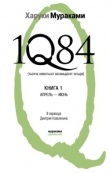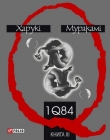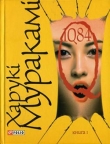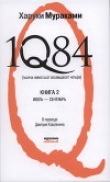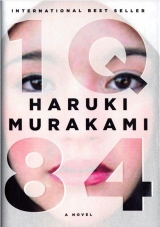
Текст книги "1q84"
Автор книги: Haruki Murakami
Жанр:
Современная проза
сообщить о нарушении
Текущая страница: 30 (всего у книги 81 страниц)
“The tape didn’t show how the dog died,” Tamaru said, as if anticipating a question from Aomame. “She wasn’t tied up at the time. There’s no way she could have untied herself, so possibly someone untied her.”
“Someone who could approach without causing her to bark.”
“That’s what it amounts to.”
“Strange.”
Tamaru nodded but said nothing. He had thought about the various possibilities so much on his own that he was sick of thinking about them. There was nothing left for him to say to anybody else.
Tamaru reached over and opened a drawer of the cabinet by his desk, taking out a black plastic bag. From the bag he took a faded blue bath towel, and when he spread the towel open, a lustrous black object emerged—a small automatic pistol. Saying nothing, he handed it to Aomame, who also remained silent as she took it. She tested the weight of it in her hand. It was much lighter than it appeared to be. Such a small, light object could deliver death to a human being.
“You just made two major mistakes. Do you know what they were?” Tamaru asked.
Aomame thought over the actions she had just taken but could discover no mistakes. All she had done was take the gun that was handed to her. “I don’t know,” she said.
“First, when you took the gun, you didn’t check to see if it was loaded or not and, if it was loaded, whether the safety was on. The second was that, after you took the gun, you pointed it—even if only for one split second—at me. You broke two absolute rules. Also, you should never put your finger inside the trigger guard if you have no intention of firing the gun.”
“I see. I’ll be careful from now on.”
“Emergency situations aside, you should never handle or hand over or carry a gun that has even one bullet in it. And whenever you see a gun, you should treat it as loaded until you know for sure otherwise. Guns are made to kill people. You can never be too careful with them. Some people might laugh at me for being too cautious, but stupid accidents happen all the time, and the ones who get killed or badly wounded are usually the ones who were laughing.”
Tamaru drew a plastic bag from his jacket pocket. Inside were seven new bullets. He set them on his desk. “As you can see, the bullets are not in the gun. The magazine is in place, but it’s empty. The chamber is empty, too.”
Aomame nodded.
“This is a personal gift from me. Even so, if you don’t use it, I’d like to have it back.”
“Of course,” Aomame said, her voice dry. “But it must have cost you something.”
“Don’t let that worry you,” Tamaru said. “You have other things to worry about. Let’s talk about those. Have you ever fired a gun?”
Aomame shook her head. “Never.”
“Revolvers tend to be easier to use than automatics, especially for amateurs. Their mechanism is simpler, and it’s easier to learn how to operate them, and you’re less likely to make mistakes with them. But a good revolver can be bulky and inconvenient to carry around. So I figured an automatic would be better for you. This is a Heckler & Koch HK4. A German make. Weighs 480 grams without bullets. It’s small and light, but its 9mm Short cartridges pack a punch, and it has a small recoil. It’s not very accurate for long distances, but it’s perfect for what you have in mind. Heckler & Koch started up after the war, but this HK4 is based on the Mauser HSc, a well-respected model from before the war. They’ve been making it since 1968, and it’s still widely used. So it’s dependable. This is not a new one, but it’s been well taken care of by somebody who obviously knew what he was doing. Guns are like cars: you can trust a good used one better than one that’s brand-new.”
Tamaru took the gun back from Aomame and showed her how to handle it—how to lock and unlock the safety, how to remove and replace the magazine.
“Make sure the safety is on when you take the magazine out. After you open the catch and pull the magazine out, you pull the slide back and the bullet pops out of the chamber—not now, of course, since the gun isn’t loaded. After that, the slide stays open, so then you pull the trigger like this and the slide closes but the hammer stays cocked. You pull the trigger again and the hammer falls. Then you put in a new magazine.”
Tamaru went through the sequence of motions with practiced speed. Then he repeated the same sequence slowly, demonstrating each separate operation. Aomame watched intently.
“Now you try it.”
Aomame carefully extracted the magazine, pulled the slide back, emptied the chamber, lowered the hammer, and reinserted the magazine.
“That’s fine,” Tamaru said. Then he took the gun from Aomame, pulled out the magazine, carefully loaded it with seven bullets, and shoved it back into the gun with a loud click. Pulling back the slide, he sent a bullet into the chamber. Then he pushed down a lever on the left side of the gun to set the safety.
“Now do the same thing you did before. Only, this time it’s loaded with real bullets. There’s one in the chamber, too. The safety is on, but you still shouldn’t point the muzzle of the gun toward anyone,” Tamaru said.
Taking the loaded gun, Aomame found it noticeably heavier than before. Now it had the unmistakable feel of death. This was a precision tool designed to kill people. She could feel her armpits sweating.
Checking once more to make sure the safety was on, she opened the catch, pulled out the magazine, and set it on the table. Pulling back the slide, she ejected the bullet from the chamber. It fell on the wooden floor with a dry thump. She pulled the trigger to close the slide, and pulled the trigger one more time, lowering the hammer. Then, with a trembling hand, she picked up the bullet from where it lay by her feet. Her throat was dry, and each breath she took was accompanied by a painful burning sensation.
“Not bad for your first time,” Tamaru said, pressing the fallen 9mm bullet back into the magazine. “But you need a lot more practice. Your hands are shaking. You should practice the movements for ejecting and reinserting the magazine several times a day until your hands learn the feel of the gun. You should be able to do it as quickly and automatically as I did. In the dark. In your case, you shouldn’t have to change magazines in mid-use, but the movements themselves are the most basic of the basic for people who handle pistols. You have to memorize them.”
“Don’t I need to practice firing?”
“Well, it’s not as if you’re going to shoot somebody with this. You’re just going to shoot yourself, right?”
Aomame nodded.
“In that case, you don’t have to practice firing. You just have to learn to load it, release the safety, and get the feel of the trigger. And anyway, where were you planning to practice firing it?”
Aomame shook her head. She had no idea.
“Also, how were you planning to shoot yourself? Here, give it a try.”
Tamaru inserted the loaded magazine, checked to make sure the safety was on, and handed the gun to Aomame. “The safety is on,” he said.
Aomame pressed the muzzle against her temple. She felt the chill of the steel. Looking at her, Tamaru slowly shook his head several times.
“Trust me, you don’t want to aim at your temple. It’s a lot harder than you think to shoot yourself in the brain that way. People’s hands usually shake, and it throws their aim off. You end up grazing your skull, but not killing yourself. You certainly don’t want that to happen.”
Aomame silently shook her head.
“Look what happened to General Tojo after the war. When the American military came to arrest him, he tried to shoot himself in the heart by pressing the muzzle against his chest and pulling the trigger, but the bullet missed and hit his stomach without killing him. Here you had the top professional soldier in Japan, and to think he didn’t know how to kill himself with a gun! They took him straight to the hospital, he got the best care the American medical team could give him, recovered, then was tried and hanged. It’s a terrible way to die. A person’s last moments are an important thing. You can’t choose how you’re born, but you can choose how you die.”
Aomame bit her lip.
“The surest way is to shove the gun barrel in your mouth and blow your brains out from below. Like this.”
Tamaru took the gun from Aomame to demonstrate. She knew that the safety was on, but the sight still made her tense up. She could hardly breathe, as if something were stuck in her throat.
“But even this isn’t one hundred percent certain. I actually know a guy who failed to kill himself and ended up in terrible shape. We were together in the Self-Defense Force. He shoved a rifle barrel in his mouth and fired the gun by pressing his big toes against a spoon he had fastened to the trigger. I suppose the barrel must have moved a little. Instead of dying, he became a vegetable. He lived that way for another ten years. It’s not so easy for people to end their own lives. It’s not like in the movies. There, they do it like nothing, no pain, and it’s all over, they’re dead. The reality is not like that. You lie in bed for ten years with the piss oozing out of you.”
Aomame nodded in silence.
Tamaru took the bullets out of the magazine and gun and put them in a plastic bag. Then he handed Aomame the gun and the bullets separately. “Now it’s not loaded.”
Aomame took them with a nod.
“Trust me, the smart thing is to think about surviving. It’s the most practical thing, too. That’s my advice to you.”
“I see,” Aomame said drily. Then she wrapped a scarf around the Heckler & Koch HK4, which was like a crude machine too, and thrust it to the bottom of her shoulder bag. This made the bag a pound or so heavier, but it didn’t change its shape. The HK4 was a small pistol.
“It’s not a gun for amateurs,” Tamaru said. “Speaking from experience, not much good can come of it. But you should be able to handle it all right. You’re like me in some ways. In a pinch, you can put the rules ahead of yourself.”
“Probably because the ‘self’ doesn’t really exist.”
Tamaru had nothing to say to that.
“You were in the Self-Defense Force?” Aomame asked.
“Yeah, in the toughest unit. They fed us rats and snakes and locusts. They’re not inedible, but they sure don’t taste good.”
“What did you do after that?”
“All kinds of stuff. Security work, mainly as a bodyguard—though maybe that’s too fancy a word for what I was doing in some cases. I’m not much of a team player, so I tend to work alone. I was involved in the underworld, too, for a little while, when that was the only thing I could find. I saw a lot of stuff going down—things that most people never have to see in their lifetimes. Still, I never got into the worst of the worst. I was always careful not to cross the line. I’m careful by nature, and I don’t think much of the yakuza. So, like I said before, my record is clean. After that, I came here.” Tamaru pointed straight down. “My life has been very settled ever since. Not that a stable life is all I’m looking for, but I’d like to try to keep things as they are for now. It isn’t easy finding jobs you like.”
“No, of course not,” Aomame said. “But really, shouldn’t I pay you something for this?”
Tamaru shook his head. “No, I don’t want your money. The world moves less by money than by what you owe people and what they owe you. I don’t like to owe anybody anything, so I keep myself as much on the lending side as I can.”
“Thank you,” Aomame said.
“If, by any chance, the cops end up grilling you about where you got the gun, I don’t want you giving them my name. And if they do come here, I’ll deny everything, of course. They’ll never find out anything about my past. If they go after Madame, though, I won’t have a leg to stand on.”
“I won’t give your name, of course.”
Tamaru pulled a folded piece of notepaper from his pocket and handed it to Aomame. On it was written a man’s name.
Tamaru said, “On July 4, you met this man at the Renoir Café near Sendagaya Station. He gave you the gun and seven bullets, and you paid him five hundred thousand yen in cash. He contacted you after he heard that you were looking for a gun. If he is questioned by police, he is supposed to freely admit to the charges and spend a few years in prison. You don’t have to tell them any more than that. As long as they can establish how the gun got into your hands, the police will come off looking good. And you might spend a little while behind bars too, for violating the Firearm and Sword Possession Control Law.”
Aomame memorized the name and handed the slip of paper back to Tamaru. He tore it into little pieces and threw it into the wastebasket. Then he said, “Like I said before, I’m very careful by nature. I almost never depend on anybody for anything, and even when I do, I still don’t trust them. I never leave things to work themselves out. But what I’m most hoping for in this case is that the gun will come back to me unused. Then no one gets in trouble, no one dies, no one gets hurt, and no one goes to prison.”
Aomame nodded. “Meaning, you want me to violate Chekhov’s rule.”
“Exactly. Chekhov was a great writer, but not all novels have to follow his rules. Not all guns in stories have to be fired,” Tamaru said. Then he frowned slightly, as if recalling something. “Oh, yes, I almost forgot something important. I have to give you a pager.”
He took a small device from his drawer and set it on the desk. It had a metal clip to attach to clothing or a belt. Tamaru picked up the phone and punched in a three-digit quick-dial code. The phone rang three times, and the pager responded by emitting a series of electronic beeps. After turning up the volume as high as it would go, Tamaru pressed a switch to turn it off. He squinted at the device to make sure it displayed the caller’s number, and then handed it to Aomame.
“I’d like you to keep this on you at all times if possible,” Tamaru said, “or at least don’t get too far away from it. If it rings, that means you have a message from me. An important message. I won’t signal you to talk about the weather. Call the number you see in the display. Right away. From a public phone. And one other thing: if you have luggage, put it in a coin locker in Shinjuku Station.”
“Shinjuku Station,” Aomame repeated.
“It goes without saying that you should be ready to travel light.”
“Of course.”
Back at her apartment, Aomame closed her curtains and took the Heckler & Koch HK4 and the bullets from her shoulder bag. Sitting at the kitchen table, she practiced ejecting and inserting the empty magazine a few times. Her speed increased with each repetition. Her movements developed a rhythm, and her hands stopped trembling. Then she wrapped the pistol in an old T-shirt and hid it in a shoe box, which she shoved to the back of the closet. The bag of bullets she stored inside the pocket of a raincoat on a hanger. Suddenly very thirsty, she took a pitcher of chilled barley tea from the refrigerator and drank three glassfuls. Her shoulder muscles were tense and stiff, and the sweat of her armpits had an unusual smell. The awareness that she now possessed a pistol was enough to make the world look a little different. Her surroundings had taken on a strange, unfamiliar coloration.
She undressed and took a hot shower to wash off the unpleasant sweat smell. Not all guns have to be fired, she told herself in the shower. A pistol is just a tool, and where I’m living is not a storybook world. It’s the real world, full of gaps and inconsistencies and anticlimaxes.
Two weeks passed uneventfully. Aomame went to work at the sports club as usual, teaching her martial arts and stretching classes. She was not supposed to change her daily pattern. She followed the dowager’s instructions as strictly as possible. Coming home, she would eat dinner alone. Afterward, she would close the curtains, sit at the kitchen table, and practice handling the Heckler & Koch HK4 until its weight and hardness, the smell of its machine oil, its brute force and quietness all became a part of her.
Sometimes she practiced blindfolded, using a scarf. Soon she could nimbly load the magazine, release the safety, and pull back the slide without seeing a thing. The terse, rhythmical sound produced by each operation was pleasing to her ears. In the dark, she gradually lost track of the difference between the sounds the implement actually made and her aural perception of the sounds. The boundary between herself and her actions gradually faded until it disappeared entirely.
At least once a day she would stand in front of the bathroom mirror and put the muzzle of the loaded gun in her mouth. Feeling the hardness of the metal against the edges of her teeth, she imagined herself pulling the trigger. That was all it would take to end her life. In the next instant, she would have vanished from this world. To the self she saw standing in the mirror, she said, A few important points: not to let my hand shake; to brace for the recoil; not to be afraid; and, most important, not to hesitate.
I could do it now if I wanted to, Aomame thought. I’d just have to pull my finger inward half an inch. It would be so easy. Why don’t I just go ahead and do it? But she reconsidered and took the pistol from her mouth, returned the hammer to its uncocked position, set the safety, and laid the gun down by the sink between the toothpaste tube and her hairbrush. No, it’s too soon for that. There’s something I have to do first.
As instructed by Tamaru, Aomame kept the pager with her at all times. She set it next to the alarm clock when she slept. She was ready to deal with it whenever it rang, but another week went by in silence.
The pistol in the shoe box, the seven bullets in the raincoat pocket, the silent pager, her handmade ice pick, its deadly point, the suitcase packed with her personal effects; the new face and the new life that must be awaiting her; the bundle of bills in a Shinjuku Station coin locker: Aomame spent the midsummer days in their presence. More and more people went off on full-fledged summer vacations. Shops closed their shutters. The streets had fewer passersby. The number of cars declined, and a hush fell over the city. She sometimes felt she was on the verge of losing track of her location. Is this actually the real world? she asked herself. If it’s not, then where should I look for reality? She had no idea where else to look, and so she had no choice for now but to recognize this as the one and only reality and to use all her strength to ride it out.
I’m not afraid to die, Aomame reassured herself. What I’m afraid of is having reality get the better of me, of having reality leave me behind.
She had gotten everything ready. She was emotionally prepared as well. She could leave her apartment at any time, as soon as Tamaru contacted her. But she heard nothing from him. The end of August was approaching. Soon summer would begin to wind down, and the cicadas outside would wring out their final cries. How could a whole month have shot by like this even though each day felt horribly long?
Aomame came home from work at the sports club, threw her sweat-soaked clothes into the hamper, and changed into a tank top and shorts. A violent downpour broke out after noon. The sky turned dark. Pebble-sized raindrops smacked down on the streets, and thunder rumbled. The streets were left soaking wet, but then the sun came out again and used all its energy to evaporate the standing water, shrouding the city in a shimmering curtain of steam. Clouds appeared as the sun was going down, covering the sky in a thick veil and hiding the moons.
She felt the need to relax a bit before preparing her supper. Drinking a cold cup of barley tea and nibbling on some edamame she had steamed earlier, she spread the evening paper on the kitchen table and proceeded to skim it in order, first page to last. Nothing piqued her interest. It was just an ordinary evening paper. When she opened to the human interest pages, however, the first thing to attract her attention was a photo of Ayumi. Aomame caught her breath and frowned.
No, it can’t be Ayumi, she thought at first. Aomame assumed she must be mistaken: it was someone who looked a lot like her young policewoman friend. Ayumi would never be so prominently featured in the newspaper, complete with a photo. The more she looked, though, the more certain she became that this was her erstwhile partner in those little sex feasts. In the close-up photo, Ayumi had the hint of a smile on her face—an artificial, uncomfortable smile. The real Ayumi always smiled in a natural, open way with her whole face. This photo looked like one that had been taken for some kind of public album. There was something unnerving in her apparent discomfort.
Aomame did not want to read the article, if possible. If she read the big headline next to the picture, she would be able to guess what had happened. But not reading the article was out of the question. This was reality. Whatever it might be, she could not pass reality by. Aomame took a deep breath and started reading.
Ayumi Nakano (26). Single. Resident of Shinjuku Ward, Tokyo.
The article reported that Ayumi had been found dead in a Shibuya hotel room. She had been strangled with a bathrobe sash. Stark naked, she was handcuffed to the bed, a piece of clothing stuffed in her mouth. A hotel staff person had found the body when inspecting the room before noon. Ayumi and a man had taken the room before eleven o’clock the night before, and the man had left alone at dawn. The charges had been paid in advance. This was not a terribly unusual occurrence in the big city, where the commingling of people gave off heat, often in the form of violence. The newspapers were full of such events. This one, however, had unusual aspects. The victim was a policewoman, and the handcuffs that appeared to have been used as a sex toy were the authentic government-issue type, not the cheap kind sold in porno shops. Quite naturally, this was news that attracted people’s attention.


